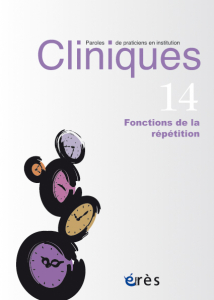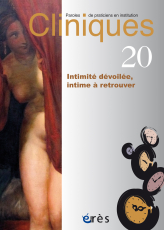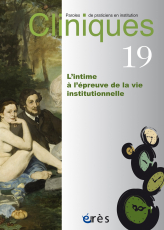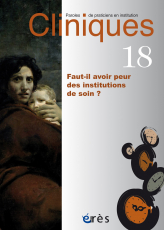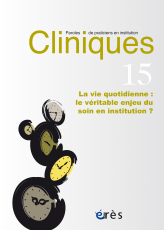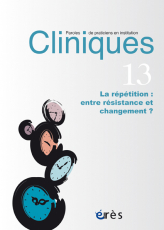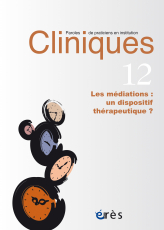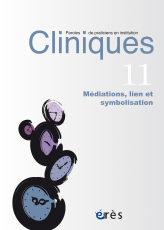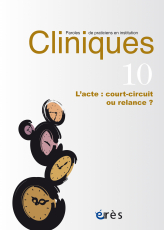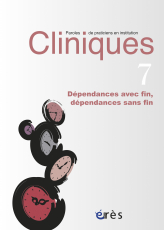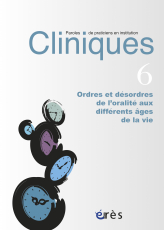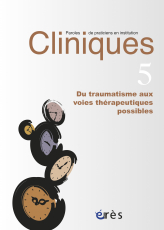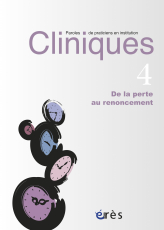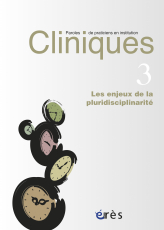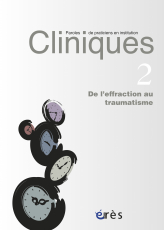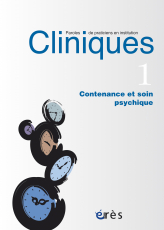Publications
Repetition’s Functions
Issue 14 : January, 2018
ISBN : 9782749256726
In the first moments of life, repetition helps access symbolization. For instance, playing hide-and-seek or Fort/Da we can observe the symbolization of alternation between presence and absence. We can then understand how repetition gives life to events by slowly giving them a meaning, how it helps their representation but also how it attempts to take control over traumatic situations initially passively experienced. But it can also be deprived of all fantasmatic foundings. Caregivers in mental care institutions have a lot to do with repetition: repetition of complaints, of behavioural disorders, of acting puts, addictions, stereotypies… How can it be avoided that repetition only be a source of suffering and exhaustion for patients and caregivers ? How can it be understood in order to help psychological work in institutions ?
Authors
Gilbert DIATKINE, Catherine DUCARRE, Catherine FOURQUES, Valentine HAGMANN, Vassilis KAPSAMBELIS, Otto KERNBERG, Veronique LAURENT, Elysé LINDE, Anne-Marie MONVILLE, Laurent OLIVIER, Sandrine PARIS, Julie PLATIAU, Régine PRAT, Philippe ROBERT, Benoit SERVANT, Jean-Marc TALPIN, Mariane VEILLEUX, Benoit VERDON
Table of contents
EDITORIAL
Patrick de Saint-Jacob
INTRODUCING THE THOUGHT
- Introduction, Catherine DUCARRE, Catherine FOURQUES, Julie PLATIAU, Mariane VEILLEUX
- « Compulsion to Repeat in Psychiatric Institutions : Another Look on Schreber’s Case », Gilbert DIATKINE
- « The Destruction of Time in Pathological Narcissism », Otto KERNBERG
REPETITION AND INSTITUTIONAL WORK
- « Repetition, Transference, Substitution in Institutional Treatment of Psychosis », Vassilis KAPSAMBELIS
- « Repeat That Again! Listening to Variations in Institution », Valentine HAGMANN, Anne-Marie MONVILLE, Benoit SERVANT
- « Two Principles in Institutional Psychological Elaboration of Changes: Dual Thought and Qualitative Thought », Jean-Marc TALPIN
REPETITION TO GROW, REPETITITON TO AGE ?
- « Restless Repetition, a Pre-transitional Area? », Véronique LAURENT
- « Working with Repetition, Welcoming it, Supporting it, Transforming it », Elysé LINDE
- « Holding Back on Time. Torments and Willfulness in Eugène Ionesco’s Late Work », Benoît VERDON
TRANSMISSION AND REPETITION
- « Repetition and Transformation in Families and Institutions », Philippe ROBERT
- « Repetition of Early Traumatic Experiences and Transgenerational Transmission of Blind Contents: Hypothesis on Mechanisms at Work », Régine PRAT
- « Repetition in Archaeological Processes », Laurent OLIVIER
ANOTHER LOOK ON REPETITION
- « Cognitive Behavioural Therapy of OCD in an Older Adult: when Repetition becomes an Obligation », Sandrine PARIS

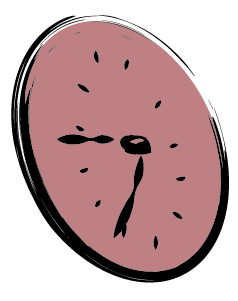 Publications
Publications 